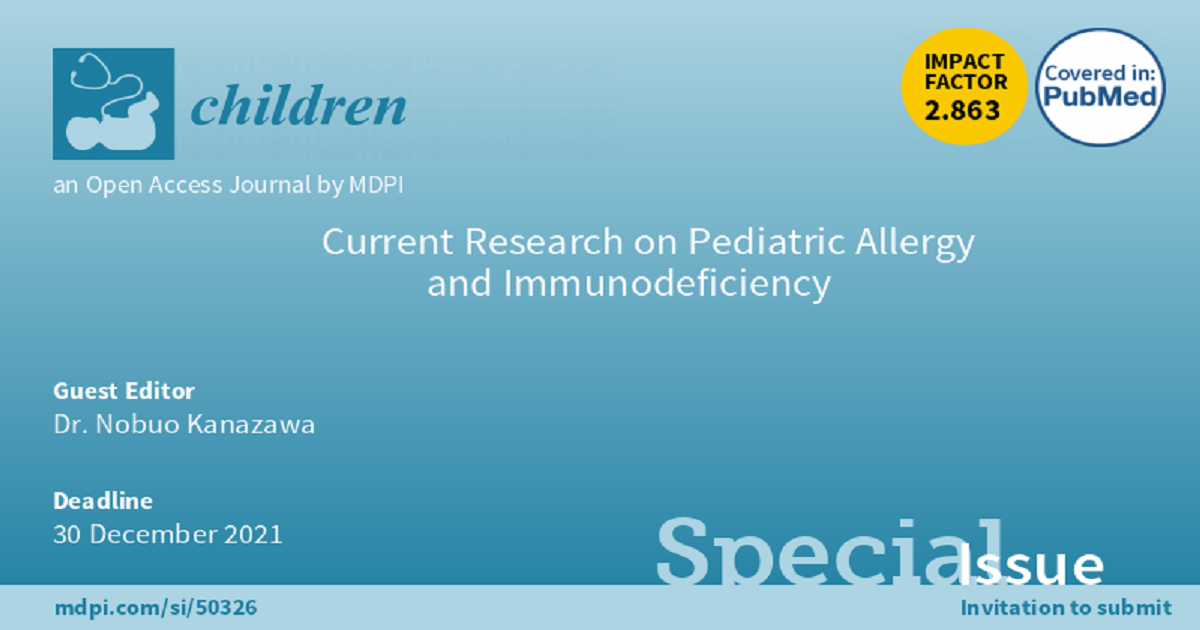- 2.1Impact Factor
- 3.8CiteScore
- 16 daysTime to First Decision
Current Research on Pediatric Allergy and Immunodeficiency
This special issue belongs to the section “Pediatric Allergy and Immunology“.
Special Issue Information
Dear Colleagues,
Immunodeficiency, a simple impairment of immunity in a narrow sense, is characterized by severe and chronic/repetitive infection. However, it can also cause allergic diseases such as atopic dermatitis, as well as autoimmune and autoinflammatory diseases. The concept of immunodeficiency can be expanded to all types of immune dysregulation. Actually, the 2019 updated IUIS classification has defined primary immunodeficiencies as human inborn errors of immunity, including 1) immunodeficiencies affecting cellular and humoral immunity, 2) combined immunodeficiencies with associated or syndromic features, 3) predominantly antibody deficiencies, 4) diseases of immune dysregulation, 5) congenital defects of phagocyte number or function, 6) defects in intrinsic and innate immunity, 7) autoinflammatory disorders, 8) complement deficiencies, and 9) bone marrow failure. Furthermore, inborn errors include not only genetic abnormalities, but also developmental abnormalities caused by environmental factors during pregnancy. In this context, allergy is considered as a subtype of immunodeficiency and characterized by type 2-deviated immune responses. Various genetic and environmental factors are associated with the development of allergies. The mechanism of action includes the impairment of skin barriers, abnormal cytoskeletal remodelling, altered cytokine or T cell signalling, restriction of T cell repertoire, failure of immune tolerance, dysregulation of mast cell activation, and so on.
In this issue, current research topics on various aspects of allergy and immunodeficiency in children are welcome, in order to discuss what has been achieved, what is now going on, and what remains to be clarified in the field of pediatric allergy and immunodeficiency.
I look forward to receiving your contributions.
Dr. Nobuo Kanazawa
Guest Editor
Manuscript Submission Information
Manuscripts should be submitted online at www.mdpi.com by registering and logging in to this website. Once you are registered, click here to go to the submission form. Manuscripts can be submitted until the deadline. All submissions that pass pre-check are peer-reviewed. Accepted papers will be published continuously in the journal (as soon as accepted) and will be listed together on the special issue website. Research articles, review articles as well as short communications are invited. For planned papers, a title and short abstract (about 250 words) can be sent to the Editorial Office for assessment.
Submitted manuscripts should not have been published previously, nor be under consideration for publication elsewhere (except conference proceedings papers). All manuscripts are thoroughly refereed through a single-blind peer-review process. A guide for authors and other relevant information for submission of manuscripts is available on the Instructions for Authors page. Children is an international peer-reviewed open access monthly journal published by MDPI.
Please visit the Instructions for Authors page before submitting a manuscript. The Article Processing Charge (APC) for publication in this open access journal is 2400 CHF (Swiss Francs). Submitted papers should be well formatted and use good English. Authors may use MDPI's English editing service prior to publication or during author revisions.
Keywords
- Allergy
- Immunodeficiency
- Infection
- Autoimmunity
- Autoinflammation
- Immune deviation
- IgE
- Mast cell
- Eosinophil
- Neutrophil
- Monocytes
- Lymphocytes

Benefits of Publishing in a Special Issue
- Ease of navigation: Grouping papers by topic helps scholars navigate broad scope journals more efficiently.
- Greater discoverability: Special Issues support the reach and impact of scientific research. Articles in Special Issues are more discoverable and cited more frequently.
- Expansion of research network: Special Issues facilitate connections among authors, fostering scientific collaborations.
- External promotion: Articles in Special Issues are often promoted through the journal's social media, increasing their visibility.
- e-Book format: Special Issues with more than 10 articles can be published as dedicated e-books, ensuring wide and rapid dissemination.

